Koori Mail: Thirty years of reporting on Aboriginal Australia
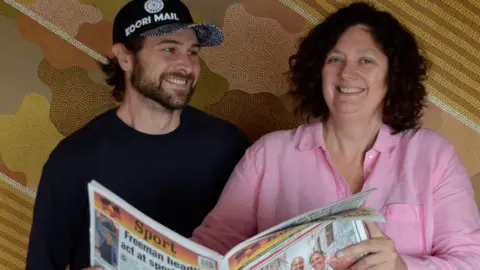 Koori Mail
Koori Mail"Shame Australia!" read the Koori Mail's first editorial 30 years ago.
"It is time for the Aboriginal community to speak out and be heard, to earn the respect we deserve and to regain our self-esteem after 200 years of brutal victimisation," it continued.
The Koori Mail, Australia's only fully indigenous-owned and managed newspaper, was born on 23 May 1991.
'Racist Violence: The Hidden Facts' was the front page headline. The story was about a new report into racist violence in Australia and how Aboriginal people were facing high levels of abuse in police custody.
Not a lot has changed 30 years on, says Naomi Moran, the Koori Mail's general manager.
"We're still printing the same headlines, the same stories, the same frustrations, the same experiences, and how that has literally been a matter of life and death for some of our people," Ms Moran says.
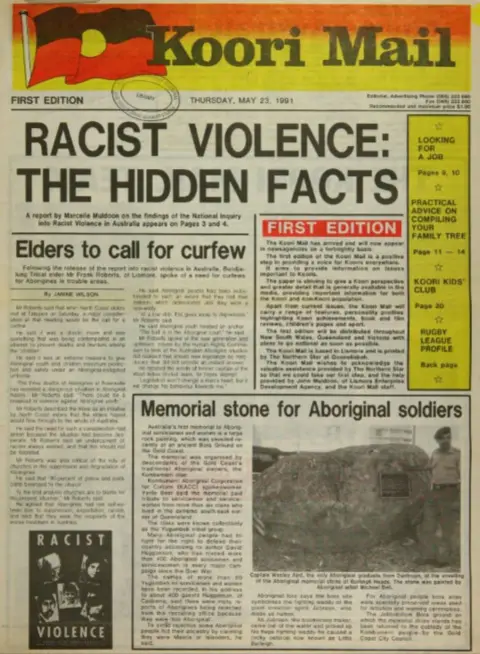 The Koori Mail
The Koori Mail
"When we look back on the last 30 years, the deaths in custody haven't gone away, the gaps between health and life expectancy haven't gone away.
"We have a responsibility as Aboriginal and Torres Strait Islander media to keep bringing these issues to the forefront and being a voice for our people where mainstream media aren't doing their due diligence," she says.
"It absolutely comes down to us."
Fighting stereotypes
For Ms Moran, a Nyangbal and Dunghutti woman, the Koori Mail means even more than that.
Growing up in Ballina, New South Wales (NSW), the newspaper became a haven for her after dropping out of school at age 14. This was despite being top of the class in some of her subjects, including English.
"You could be the highest achiever in the class as an Aboriginal person but there are still those stereotypes that exist with the teachers. I felt at times I wasn't really acknowledged for my ability to learn and achieve because I was just another Aboriginal student," she says.
"The stereotype is that black fellas here will either become artists or sportspeople."
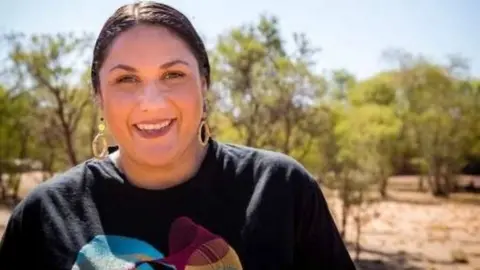 Naomi Moran
Naomi MoranBy her teenage years, things started to deteriorate at school. She was being bullied and was also struggling with the stark contrast in how she was taught by school teachers in comparison to elders within her community.
"There is no top class, there is no hierarchy. We come from an education system that is far more autonomous than the white man's education," Ms Moran says.
"I was uncomfortable in an education environment that didn't acknowledge that regardless of grades and test scores - we were all educated in the eyes of our ancestors."
Eventually Ms Moran says she committed an act of "self-sabotage" by getting into a fight at school which resulted in her leaving.
Her mother said she either needed to find a job or return to school.
"Our family has a really strong legacy of work ethic," Ms Moran says. "Our ancestors and those who came before us really fought to occupy spaces of employment and education to set up futures for themselves and their families."
She heard that the Koori Mail was looking for a trainee receptionist. She applied and started working for the newspaper soon after. Within a year she had moved up into the advertising department.
Ms Moran says the Koori Mail was more than just a first step on the career ladder.
"I was working for an Aboriginal organisation that was ultimately culturally responsible for sharing the voices of our people," she says.
"From a very early age that really resonated with me and made me want to dedicate my time to not just pursuing my career but also making a contribution to the Koori Mail."
The Koori Mail was started by a Walbunja businessman called Owen Carriage. Profits are returned to the community through its five owner organisations and the money has been used for everything from scholarships for Aboriginal students, to housing and mental health programmes.
The fortnightly newspaper based in Lismore, NSW, has a circulation of around 10,000 but it is estimated to be read by close to 100,000 people.
While there has been a shift towards a more digital approach in recent years and plans for a podcast series, Ms Moran says the print newspaper remains at the heart of the organisation.
"We know our old people love to pick up the newspaper, it's a valuable resource for schools or for universities when they have that paper in hand."
'We need our voice'
Like Ms Moran, Nick Paton, a Ngunawal man and reporter at the Koori Mail, says the newspaper has had a huge effect on his life in the two years he's been there.
Mr Paton says he felt a disconnect with his indigenous roots growing up, and reporting for the Koori Mail has played a part in him "putting the pieces back together about my mob and where I come from".
Mr Paton says he "fell into journalism by accident" in his 30s while studying for a degree in Indigenous Knowledge. He was persuaded by a friend to apply for a cadetship at the Koori Mail, but he was hesitant as he had no experience as a reporter.
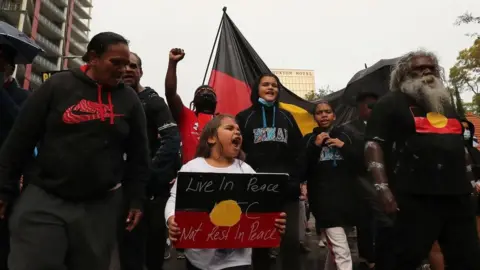 Getty Images
Getty ImagesHis application was successful and he has since reported on a broad range of issues, including the Black Lives Matter movement.
That movement put a spotlight on Australia's incarceration of indigenous people and their deaths in custody. Aboriginal people have the highest rate of incarceration of any group in the world.
"We need our voices on these issues to come through because as much as we'd like to rely on the mainstream media, they might give little snippets of what's happening in the Black Lives Matter movement, but it's not enough," he says.
Positive stories
The Koori Mail's editor, Rudi Maxwell, thinks there have been some improvements in the way Australian mainstream media reports on indigenous issues, and acknowledges the increased representation of Aboriginal and Torres Strait Islander people in newsrooms.
But progress has been slow and much of the reporting is still poor, she says.
"I think that nuance is often missed and I think too many assumptions are made by non-Aboriginal journalists who don't actually have an understanding of the background or the context in which they're writing," she says.
There is also a problem with stories being ignored due to the "deficit narrative", Ms Maxwell says. This is a way of reporting and thinking that frames Aboriginal identity in a narrative of negativity, deficiency and disempowerment.
"Positive stories about Aboriginal and Torres Strait Islander people doing great things - innovations, starting their own companies, fashion labels, artists doing amazing things, authors," she says. "Those types of positive stories tend to get ignored in the mainstream, but they're our bread and butter."
Kirli Saunders, a Gunai writer who won 2020 NSW Aboriginal Woman of the Year, says the Koori Mail is her "go-to" for Aboriginal news.
"I don't know of any other Black media organisation that celebrates the survival and strengths of our communities the way the Koori Mail does," Ms Saunders says.
"The Koori Mail are never afraid to speak up, especially in the way they amplify Black voices and hold a special place for mob to connect across time and space."
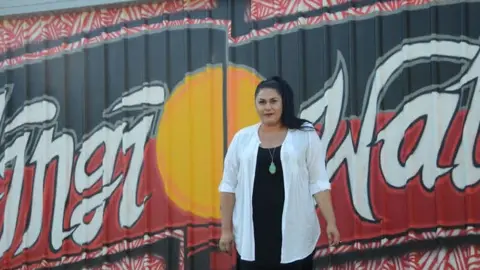 Naomi Moran
Naomi MoranDespite the challenges of running a newspaper during the coronavirus pandemic, the Koori Mail managed to keep hold of all 12 members of staff and is continuing to document the stories of its community.
"We have a lot of issues that our people are facing in this country and the lack of a black lens over those issues is really telling," Ms Moran says.
"It's about protecting and sustaining our heritage, our stories and our languages. It's about being a trusted voice for our people… but also about supporting the next generation of journalists and writers."
